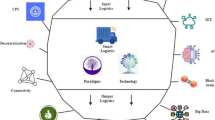Abstract
This article highlights the significant advancements that can be achieved by implementing Big Data (BD), Artificial Intelligence (AI), and the Internet of Things (IoT) in transporting delicate and sensitive products, with a specific focus on reducing delivery time (DT). Through a thorough study conducted over a defined period, we assess the outcomes of incorporating innovative BD, AI, and IoT technologies to diminish delivery delays and enhance punctual arrivals at designated destinations. Our findings indicate that utilizing these three technologies can remarkably improve delivery delays, surpassing 6%, 11%, and 13% for BD, AI, and IoT, respectively, compared to conventional transport (CT), while ensuring the utmost security measures. Furthermore, by achieving perfect synchronization of the arrival and departure of different means of transport, the overall efficiency and reliability of the transportation process are significantly enhanced.
Access this chapter
Tax calculation will be finalised at checkout
Purchases are for personal use only
Similar content being viewed by others
References
Dong C, Akram A, Andersson D, Arnäs P-O, Stefansson G (2021) The impact of emerging and disruptive technologies on freight transportation in the digital era: current and future trends. The International Journal of Logistics Management 32(2):386–412. https://doi.org/10.1108/IJLM-01-2020-0043
Loukili Y, Lakhrissi Y, Ali SEB (2022) Geospatial Big Data Platforms: A Comprehensive Review. KN J. Cartogr. Geogr. Inf. 72:293–308. https://doi.org/10.1007/s42489-022-00121-7
Aboushelbaya, R., Aguacil, T., Huang, Q., Norreys, P.A. (2022). Efficient Location-Based Tracking for IoT Devices Using Compressive Sensing and Machine Learning Techniques. In: Nikeghbali, A., Pardalos, P.M., Raigorodskii, A.M., Rassias, M.T. (eds) High-Dimensional Optimization and Probability. Springer Optimization and Its Applications, vol 191. Springer, Cham. https://doi.org/10.1007/978-3-031-00832-0_12
Abduljabbar R, Dia H, Liyanage S, Bagloee SA (2019) Applications of Artificial Intelligence in Transport: An Overview. Sustainability 11(1):189. https://doi.org/10.3390/su11010189
Day, R.J., Salehi, H., Javadi, M. (2019) IoT Environmental Analyzer using Sensors and Machine Learning for Migraine Occurrence Prevention. In: Proceedings of the 18th IEEE International Conference on Machine Learning and Applications (ICMLA), Boca Raton, FL, USA, 2019, pp. 1460–1465. doi: https://doi.org/10.1109/ICMLA.2019.00239.
Walter S (2023) AI impacts on supply chain performance: a manufacturing use case study. Discov Artif Intell 3:18. https://doi.org/10.1007/s44163-023-00061-9
Chabel, S., Ar-Reyouchi, E.M. (2023). Artificial Intelligence: An Effective Protocol for Optimized Baggage Tracking and Reclaim. In: Shakya, S., Balas, V.E., Haoxiang, W. (eds) Proceedings of Third International Conference on Sustainable Expert Systems. Lecture Notes in Networks and Systems, vol 587. Springer, Singapore. https://doi.org/10.1007/978-981-19-7874-6_56.
Matsuzaka Y, Yashiro R (2023) AI-Based Computer Vision Techniques and Expert Systems. AI 4(1):289–302. https://doi.org/10.3390/ai4010013
Sefraoui, O., Bouzidi, A., Ghoumid, K., Ar-Reyouchi, E.M. (2023). An Attractive Proposal Based on Big Data for Sentiment Analysis Using Artificial Intelligence. In: Jacob, I.J., Kolandapalayam Shanmugam, S., Izonin, I. (eds) Data Intelligence and Cognitive Informatics. Algorithms for Intelligent Systems. Springer, Singapore. https://doi.org/10.1007/978-981-19-6004-8_26
Ar-Reyouchi EM, Ghoumid K, Ar-Reyouchi D, Rattal S, Yahiaoui R, Elmazria O (2022) Protocol wireless medical sensor networks in IoT for the efficiency of healthcare. IEEE Internet of Things J 9(13):10693–10704. https://doi.org/10.1109/JIOT.2021.3125886
Rattal, S., Ghoumid, K., Ar-Reyouchi, E.M. (2022). A Flexible Protocol for a Robust Hospitals Network Based on IoT. In: Pandian, A.P., Fernando, X., Haoxiang, W. (eds) Computer Networks, Big Data and IoT. Lecture Notes on Data Engineering and Communications Technologies, vol 117. Springer, Singapore. https://doi.org/10.1007/978-981-19-0898-9_69
Ichoua1, S., Gendreau, M., Potvin, JY. (2007). Planned Route Optimization For Real-Time Vehicle Routing. In: Zeimpekis, V., Tarantilis, C.D., Giaglis, G.M., Minis, I. (eds) Dynamic Fleet Management. Operations Research/Computer Science Interfaces Series, vol 38. Springer, Boston, MA. https://doi.org/10.1007/978-0-387-71722-7_1.
W. Ongcunaruk et al.Genetic algorithm for a delivery problem with mixed time windows Computers & Industrial Engineering (2021).
Yuan Y, Li H, Ji L (2021) Application of Deep Reinforcement Learning Algorithm in Uncertain Logistics Transportation Scheduling. Comput Intell Neurosci 25(2021):5672227. https://doi.org/10.1155/2021/5672227.PMID:34608384;PMCID:PMC8487393
Dzalbs I, Kalganova T. Accelerating supply chains with Ant Colony Optimization across a range of hardware solutions. Comput Ind Eng. 2020 Sep;147:106610. doi: https://doi.org/10.1016/j.cie.2020.106610. Epub 2020 Jun 29. PMID: 32834426; PMCID: PMC7323691.
Dai K, Zhu Z, Tang Y et al (2021) Position synchronization tracking of multi-axis drive system using hierarchical sliding mode control. J Braz Soc Mech Sci Eng 43:204. https://doi.org/10.1007/s40430-021-02906-9
Papoutsis K, Dewulf W, Vanelslander T et al (2018) Sustainability assessment of retail logistics solutions using external costs analysis: a case study for the city of Antwerp. Eur Transp Res Rev 10:34. https://doi.org/10.1186/s12544-018-0297-5
Author information
Authors and Affiliations
Corresponding author
Editor information
Editors and Affiliations
Rights and permissions
Copyright information
© 2024 The Author(s), under exclusive license to Springer Nature Singapore Pte Ltd.
About this paper
Cite this paper
Chabel, S., Ar-Reyouchi, E.M. (2024). Perishable Products: Enhancing Delivery Time Efficiency with Big Data, AI, and IoT. In: Jacob, I.J., Piramuthu, S., Falkowski-Gilski, P. (eds) Data Intelligence and Cognitive Informatics. ICDICI 2023. Algorithms for Intelligent Systems. Springer, Singapore. https://doi.org/10.1007/978-981-99-7962-2_21
Download citation
DOI: https://doi.org/10.1007/978-981-99-7962-2_21
Published:
Publisher Name: Springer, Singapore
Print ISBN: 978-981-99-7999-8
Online ISBN: 978-981-99-7962-2
eBook Packages: Intelligent Technologies and RoboticsIntelligent Technologies and Robotics (R0)




